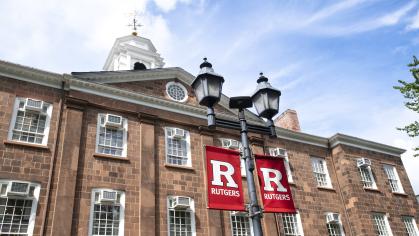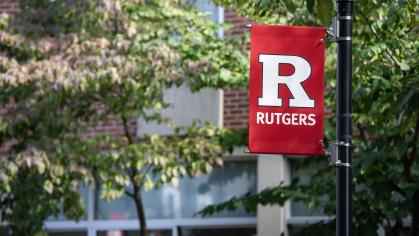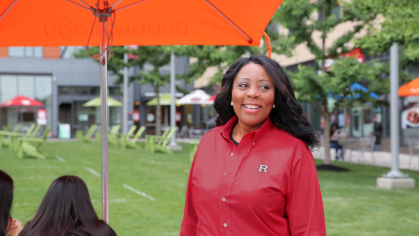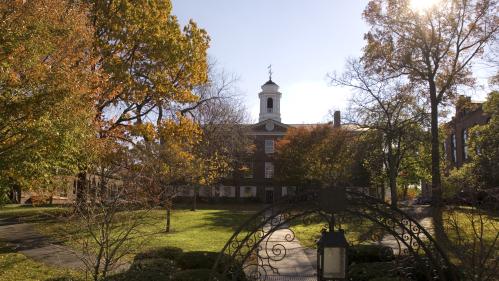
Chancellor Challenge
Innovative, interdisciplinary collaboration for the common good
Meeting the Challenge
The Chancellor Challenge periodically invites members of Rutgers–New Brunswick’s rich and diverse scholarly community to propose transformational, campus-wide initiatives focused on specific goals of the Academic Master Plan. The Chancellor’s Office selects outstanding ideas for development, grant funding, and implementation.
Selected Submissions
In May 2024, the Chancellor Challenge sought innovative new initiatives to promote student success and community engagement. Faculty and staff submitted 45 proposals and, following a competitive review process, three were selected for the next phase of clarification and development. Implementation of each project is expected to begin July 1, 2025.
“RU Engaged” Service-Learning Byrne Seminars with Integrated Alternative Spring Breaks
A proposed partnership between the Division of Student Affairs, Byrne Seminars, the School of Environmental and Biological Sciences (SEBS), and Bloustein School of Planning and Public Policy to provide first-year students with a suite of seminars on the inner workings of community engagement, focused on social determinants of health. Each seminar would link with an alternative spring break of service-learning with community-based organizations in the City of New Brunswick.
This proposal is led by Kathe Newman, Professor in the Bloustein School and Director of the Ralph W. Voorhees Center for Civic Engagement; and Cara Cuite, Associate Extension Specialist and Undergraduate Program Director at SEBS.
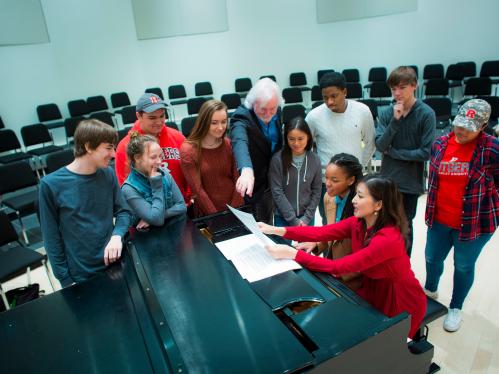
Faculty Career Fellows
A proposed collaboration between Career Exploration and Success (CES) and the Institute for Teaching, Innovation, and Inclusive Pedagogy (TIIP) to provide faculty members with the skills and resources needed to help their students connect their classroom learning goals with career readiness competencies, thus building the skills that will lead to post-graduation success.
This proposal is led by Rania Plazas, Assistant Director of Rutgers Internship and Co-Op Programs at CES; and Tracie Addy, Director of TIIP.
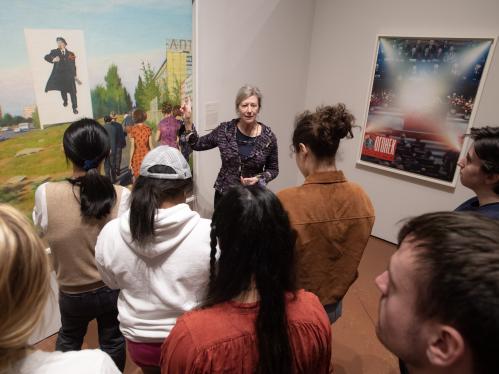
Student Wellness Collaborative
A proposed partnership between the School of Environmental and Biological Sciences, the Division of Student Affairs, and ScarletWell to pilot a holistic wellness hub that would leverage IFNH’s green spaces and other facilities to offer programs addressing the eight dimensions of financial, social, emotional, spiritual, intellectual, physical, and environmental wellness; reduce stigma around wellness services; offer experiential learning and leadership opportunities for students; and support a culture of community-building and resilience.
This proposal is led by Ann Gould, Dean of Academic Programs at SEBS; and Patty Oehmke, who currently serves in Michigan State University as a Project Manager of the University Health and Wellbeing Strategic Plan, and who will join Rutgers as Director of Wellness at SEBS on July 1, 2025.
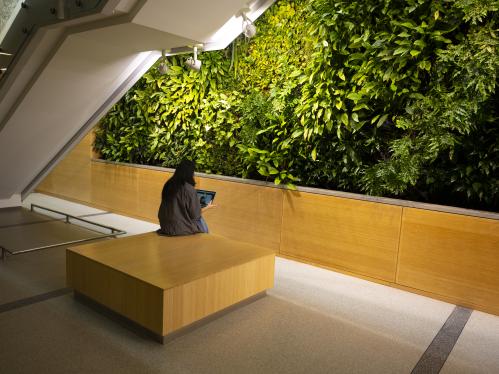



Past Chancellor Challenge Awards
-
The Cluster on Data Science and Artificial Intelligence (CDSAI) will hire 11 new faculty members and create a cross-disciplinary scholarly community focused on the societal benefits and implications of artificial intelligence, machine learning, and data science. The search process for the four faculty cluster teams will begin the 2023-2024 academic year and include:
- Transparency and Interpretability of AI: Three faculty hires in the School of Arts and Sciences. State-of-the-art AI programs are trained on massive amounts of data that can be nearly impossible to understand and explain, and their automated decisions are being incorporated throughout society. This group will meet the urgent need to study the principles and foundations of AI programs toward the development of AI systems that can be understood, explained, audited, and contested, and the establishment of a transparent and interpretable foundation for this new, transformative technology.
- Computational Social Science: Social Inequality and Democratic Participation: Four hires in the School of Communication and Information and SAS. Computational social science is an interdisciplinary field that applies computer science tools and techniques to analyze vast amounts of digital information in concert with social science theories and methods to understand complex systems and dynamic processes that affect individuals, groups, institutions, communities, and society. Advances in this field will lead to advances in understanding and addressing social inequalities and democratic participation.
- Data Science-Enabled Engineering: Two hires in the School of Engineering. This group will analyze the potential for artificial intelligence, data science, and machine learning to help engineers take on radical problems such as achieving near-zero waste, discovering materials with advanced characteristics, and fully automating large-scale factories that adapt to their dynamics as well as those of complex supply chains.
- AI for Climate and Biodiversity: Two hires in the School of Environmental and Biological Sciences and SAS. This group will explore the potential of AI in addressing climate change and biodiversity loss. Oceanic, land-based, and space-based sensor technology produces thousands of gigabytes of data on Earth systems, and the next challenge will be integrating these data sources to uncover new interdependencies, forecast and offset the impacts of extreme climate events, and provide real-time feedback on the impact of policy solutions.
-
Date Awarded: July 1, 2023
Amount Awarded: $400,000
Awardees’ Schools: School of Engineering, School of Arts and Sciences
Principal Investigators: Alyson Brooks, Associate Professor of Physics and Astronomy, School of Arts and Sciences; Shantenu Jha, Professor of Computer Engineering, School of Engineering
Abstract: There are many challenges to overcome in order to enable large-scale AI for science, engineering, and environment (AI4SEE). The primary challenges are (1) the ability to design, develop, and deploy the large-scale AI/ML models and methods specific to science questions and domains, and (2) the integration of these large-scale AI models into traditional computational and experimental modes of scientific inquiry so as to enhance science and engineering discovery. To address these challenges across departments and schools at Rutgers–New Brunswick in a coordinated, scalable, and sustainable way, we propose the Cyberinfrastructure for AI for Science and Society (CASS) initiative. CASS is a response to Pillars I and II of the Chancellor's challenge in the priority area “Cyberinfrastructure and Data Science/Artificial Intelligence.”
CASS will research and develop cyberinfrastructure—software, systems, tools, methods, and algorithms—to advance AI4SEE. CASS will lead to the ability to design, develop, and deploy powerful and revolutionary AI models and methods to advance science and engineering discovery. CASS will translate and integrate fundamental AI capabilities such as inference, optimization, and deep learning into functional capabilities across diverse science, engineering, and environmental domain areas. These research directions reveal cross-cutting cyberinfrastructure requirements and opportunities, such as scientific workflows and data life-cycle and software systems that need investigation and innovation.
-
Date Awarded: March 13, 2023
Amount Awarded: $49,215
Awardees’ Schools: School of Environmental and Biological Sciences, Mason Gross School of the Arts
Principal Investigators: Rebecca Cypess, Associate Dean for Academic Affairs and Associate Professor of Music, Mason Gross School of the Arts; Mary Nucci, Assistant Dean for Campus Engagement and Assistant Research Professor, School of Environmental and Biological Sciences
Abstract: Our hypothesis is that nature journaling as a habit will support emotional health and well-being, reduce loneliness while creating a sense of community and belonging, support confidence and life skills building with long-term impact, and increase connections with the natural world. In order to assess this hypothesis, we will study the impact of Notice Nature through the newly formed Arts in Health Research Lab, a collaboration of Mason Gross, the Rutgers School of Public Health, and the New Jersey Performing Arts Center founded to study the effects of arts experiences on health and well-being. We will work with colleagues in this lab to measure whether and how nature journaling accomplishes these goals. We anticipate that this assessment of Notice Nature will contribute to the growing body of evidence suggesting that arts- and nature-integrated activities can increase emotional well-being and a sense of belonging. Notice Nature aims to (1) support student’s well-bring through connection to nature, engagement with the arts, and increased real-time, in-person interaction with peers and (2) advance students’ awareness of and appreciation for nature, which can increase empathy and desire to take action as stewards of nature. Students’ sense of responsibility for the natural world will advance the priority of Climate and Sustainability.
-
Date Awarded: July 1, 2023
Amount Awarded: Jointly with “Transforming Climate Change Scholarship at Rutgers–New Brunswick” and as part of the creation of the Rutgers Climate and Energy Institute: $2,550,000
Awardees’ Schools: School of Engineering, School of Arts and Sciences
Principal Investigators: Onur Bilgen, Associate Professor of Mechanical and Aerospace Engineering, School of Engineering; Josh Kohut, co-founder of the Center for Ocean Observing Leadership and Professor of Marine Science, School of Environmental and Biological Sciences
Abstract: Our broad vision is that, by 2035, New Jersey will be a global leader in offshore wind (OSW) energy research, development, and deployment, and that Rutgers will be globally known for its integrated approach to the economics, engineering, environmental science, and policy of wind energy. In a recent State of Innovation Report, Governor Murphy recognized Rutgers as one of the “leading maritime and coastal research institutions in the region.”
To ensure that Rutgers is well positioned to be a leader in the State’s design, and for the Common Good, we are proposing the critical planning steps toward a long-term vision of a state-of-the-art Net-Zero Wind Energy Test (WET) Center for testing of OSW turbines with capacity and capabilities unmatched in the world. We have a total of four deliverables, covering focus areas in (1) the Common Good, (2) research, (3) teaching, and (4) collaboration and outreach. A key Common Good deliverable is to (1) establish design requirements and preliminary architectural design of a net-zero full-feature OSW test facility—we call this the Net-Zero WET Center. The key research deliverable is to (2) establish a state-of-the-art model-scale OSW testing laboratory at Rutgers which is critically needed for multidisciplinary model (e.g., digital twin) development—we call this the Rutgers WET Lab. While providing significant research/educational value on its own, the model-scale Rutgers WET Lab will be the seed for and an enabler of the full-feature Net-Zero WET Center. The key teaching deliverable is to (3) develop, pilot, and assess a laboratory-type course for a floating OSW turbine. The key collaboration and outreach deliverable is (4) to design and execute internal and external collaboration and outreach activities to promote collaborations within the Rutgers community, as well as with the OSW energy industry, government agencies, and other stakeholders. -
Date Awarded: July 1, 2023
Amount Awarded: Jointly with “Planning for a Future Full-Feature Net-Zero Wind Energy Test (WET) Center” and as part of the creation of the Rutgers Climate and Energy Institute: $2,550,000
Awardees’ Schools: School of Environmental and Biological Sciences, School of Arts and Sciences
Principal Investigators: Julie Lockwood, Interim Director of the Rutgers Institute of Earth, Ocean, and Atmospheric Sciences and Professor of Ecology, Evolution and Natural Resources, School of Environmental and Biological Sciences; Robin Leichenko, Associate Dean of Social and Behavioral Sciences and Professor of Geography, School of Arts and Sciences
Abstract: The mission of the Rutgers Climate and Energy Institute is to contribute to a resilient, equitable, and sustainable climate future. This mission is achieved by connecting faculty, students, and stakeholders through transformative climate change research, innovation, education, and outreach.
The Rutgers Climate and Energy Institute will be a force multiplier that enables Rutgers–New Brunswick to make significant advances in producing the knowledge needed for a resilient, equitable, and sustainable climate future beyond the current situation, communicating that scholarship to the public and inspiring climate action. Our vision for RCEI capitalized on our existing reputation in climate change and renewable energy scholarship and builds toward the creation of a truly multi-disciplinary community of climate change and renewable energy scholars. RCEI will support, coordinate, generate, and communicate the broad range of climate-change and renewable-energy scholarship that takes place across the Rutgers–New Brunswick campus.
The formation of RCEI allows the streamlining of communication functions for climate change and renewable energy. It also entails the creation of physical and virtual spaces for faculty, students, and stakeholders to generate, find, and use climate change and renewable energy resources at Rutgers–New Brunswick. Importantly, a clear Rutgers–New Brunswick “home” for climate change and renewable energy scholarship, embodied by RCEI, enables increased Rutgers–New Brunswick investments to be directed toward their greatest effect and for philanthropic investors to more easily identify where their interests and goals will be amplified.
The Rutgers Climate and Energy Institute will include the scholarship themes of earth systems, engineering technology, and human dimensions of climate change. RCEI will support convergence and synthesis efforts within each theme while providing mechanisms for connections across themes that advance new and innovative ways of thinking and communicating about climate change impacts, adaptation, and mitigation. We envision that these three core themes will be the heart of RCEI with area leads representing each. However, scholarship clusters within these thematic areas are expected to change over time in tandem with evolutions of climate change scholarship and faculty expertise at Rutgers–New Brunswick.
Chancellor Challenge Announcements
Learn about past Chancellor Challenge projects and watch this space for forthcoming announcements about Chancellor Challenge proposals representing pillars of the Academic Master Plan.
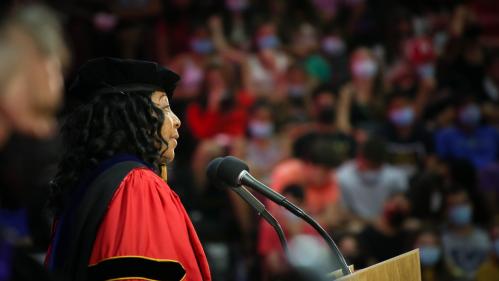
Opportunities to Engage
Learn more about Chancellor Conway's strategic priorities and initiatives


